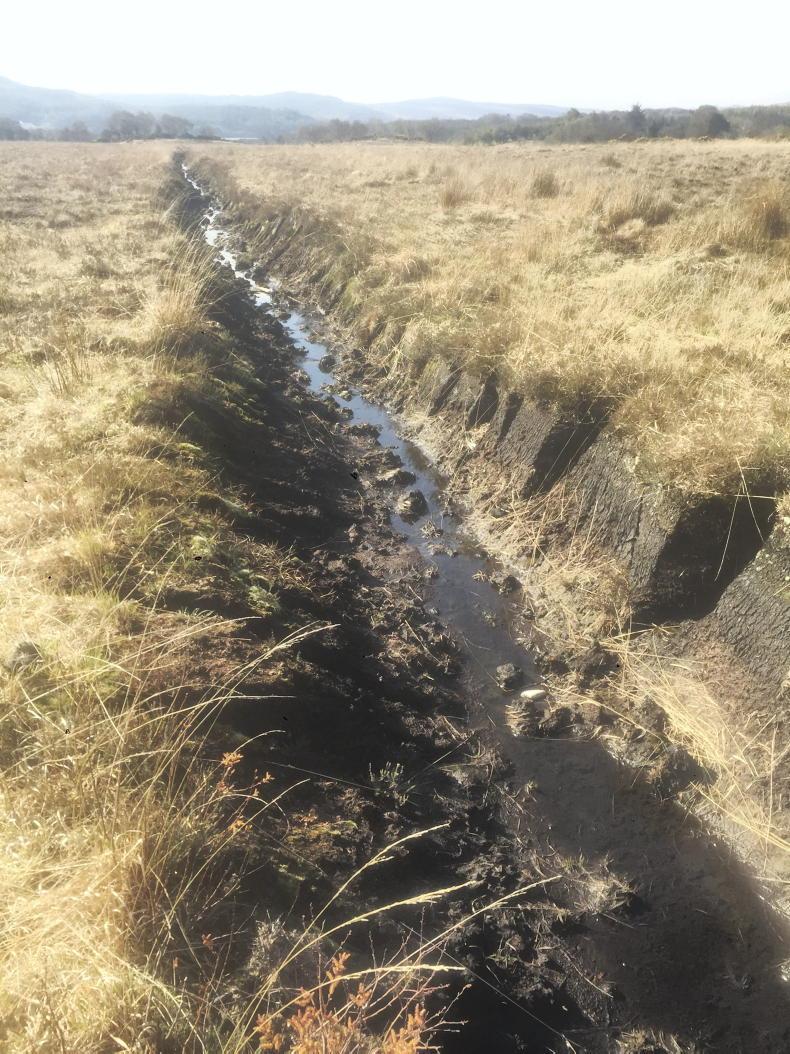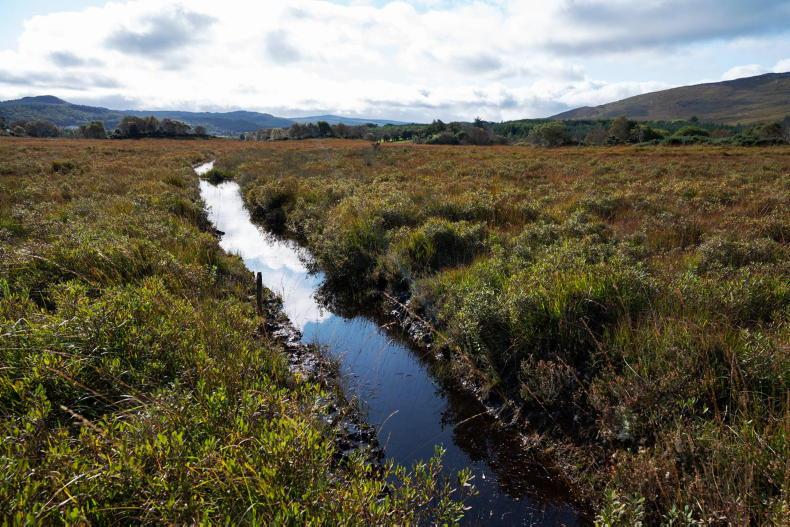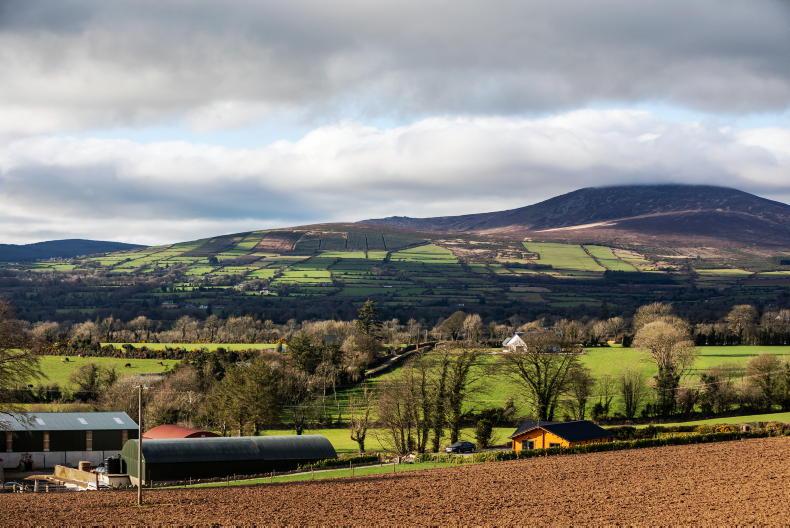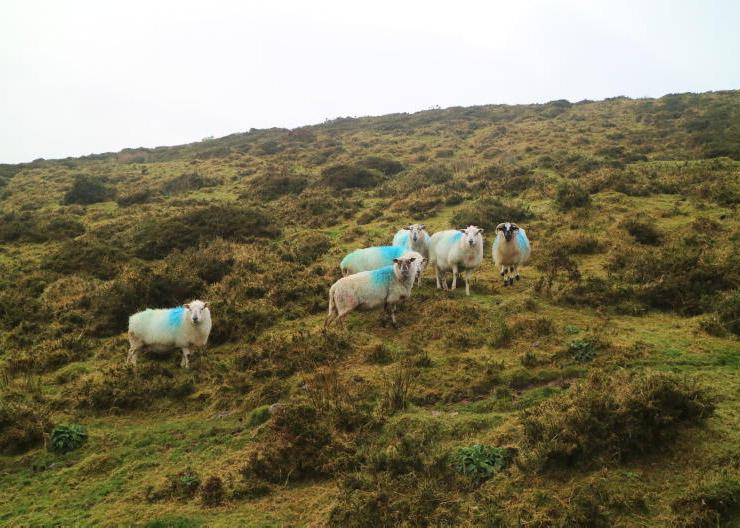A number of years ago, a man drove into Donegal sheep farmer James Forrest’s yard to have a conversation with him.
That man was Dr Patrick Crushell of the Pearl Mussel Project and the conversation resulted in James rewetting 9ha of his land in Church Hill, some of it bogland he was cutting turf on, to conserve the freshwater pearl mussel.
“We got talking and I got very interested very quickly,” James told the Irish Farmers Journal.
“He told me there were mussels in the river behind my farm, that they weren’t reproducing and that he wanted to carry out a study as to why that was,” he said.

James Forrest's land before it was rewet under the Pearl Mussel Project.
The farmer signed up to a pilot scheme to see if it would help the water quality and the mussels in turn – the Pearl Mussel Project.
“Gartan Lake is at the front of my house and there’s hill land at the back of it, where I’ve cut turf for years. The scheme is a very good scheme, the way it’s set up. The more you do to improve the quality of the ground, the higher the payment.
“They [the scheme advisers] encouraged me to stop turf cutting and they wanted me to plug the drains to slow down the water run-off. In 2019, I stopped cutting turf and got a machine in to put in the plugs.

James Forrest's land before it was rewet under the Pearl Mussel Project.
“They also asked me to take out conifers and rhododendron, which I’m working on at the moment. Most of the conifers are gone. We’re in the process of removing the rhododendrons.”
James said there has been a “dramatic recovery” in the vegetation in the area that has been rewet.
“Where there were plots of turf cut, there’s now a better quality area with heather, vegetation and other wee plants. When I walked out there it was all heather to me, but when the adviser came out with a quadrant [to measure what species were present], they picked out different varieties of lichen moss and heather,” he said.

James Forrest farms in Churchill, Co Donegal. \ Clive Wasson
Drain blocking
“I’ve put in 2km of drains on 9ha. It hasn’t affected my neighbours. The way the land leans, a small section of it drains into a bit of a shuck (drain), which would empty on to the neighbours’ land. All the rest is bordered by myself and empties into the Glaskeelan River. The plugs are slowing that run-off there.”
James keeps 140 lowland ewes, Suffolks and Texels. He has a mix of marginal hill land and good land.

Part of James Forrest's bog which was rewet. \ Clive Wasson
“My only reservation going into the scheme was losing stock to the blocked drains. They’re somewhat of a blessing. I’ve watched the sheep walking on the bog and they are using the drain plugs at little bridges. They can cross and meander at any point. It’s very extensive.
“The scheme gives me a small sense that I’m doing my bit for the environment and I’m getting rewarded for it.
“When I went into the scheme I was scoring low, with the peat and the conifers.”
Mary McAndrew, the west and northwest catchment officer with the Pearl Mussel Project, told the Irish Farmers Journal that when James joined in the scheme in 2019, the 9ha plot was getting a score of minus four.

“In 2020, the score increased to four and in 2021, he is now at a score of six. The reason for the score being low was it was scoring low in the vegetation structure, free-flowing drains and bare soil parts of the scorecard,” she said. On the scoring system, scores under a four do not receive a payment.
James will be passing on the farm to his daughter Amy in the future and he is happy he will be leaving it in a better place, by being involved in the project, for her.
“Amy will be taking over the farm when I’m finished – it’s not all about big farming.”
A number of years ago, a man drove into Donegal sheep farmer James Forrest’s yard to have a conversation with him.
That man was Dr Patrick Crushell of the Pearl Mussel Project and the conversation resulted in James rewetting 9ha of his land in Church Hill, some of it bogland he was cutting turf on, to conserve the freshwater pearl mussel.
“We got talking and I got very interested very quickly,” James told the Irish Farmers Journal.
“He told me there were mussels in the river behind my farm, that they weren’t reproducing and that he wanted to carry out a study as to why that was,” he said.

James Forrest's land before it was rewet under the Pearl Mussel Project.
The farmer signed up to a pilot scheme to see if it would help the water quality and the mussels in turn – the Pearl Mussel Project.
“Gartan Lake is at the front of my house and there’s hill land at the back of it, where I’ve cut turf for years. The scheme is a very good scheme, the way it’s set up. The more you do to improve the quality of the ground, the higher the payment.
“They [the scheme advisers] encouraged me to stop turf cutting and they wanted me to plug the drains to slow down the water run-off. In 2019, I stopped cutting turf and got a machine in to put in the plugs.

James Forrest's land before it was rewet under the Pearl Mussel Project.
“They also asked me to take out conifers and rhododendron, which I’m working on at the moment. Most of the conifers are gone. We’re in the process of removing the rhododendrons.”
James said there has been a “dramatic recovery” in the vegetation in the area that has been rewet.
“Where there were plots of turf cut, there’s now a better quality area with heather, vegetation and other wee plants. When I walked out there it was all heather to me, but when the adviser came out with a quadrant [to measure what species were present], they picked out different varieties of lichen moss and heather,” he said.

James Forrest farms in Churchill, Co Donegal. \ Clive Wasson
Drain blocking
“I’ve put in 2km of drains on 9ha. It hasn’t affected my neighbours. The way the land leans, a small section of it drains into a bit of a shuck (drain), which would empty on to the neighbours’ land. All the rest is bordered by myself and empties into the Glaskeelan River. The plugs are slowing that run-off there.”
James keeps 140 lowland ewes, Suffolks and Texels. He has a mix of marginal hill land and good land.

Part of James Forrest's bog which was rewet. \ Clive Wasson
“My only reservation going into the scheme was losing stock to the blocked drains. They’re somewhat of a blessing. I’ve watched the sheep walking on the bog and they are using the drain plugs at little bridges. They can cross and meander at any point. It’s very extensive.
“The scheme gives me a small sense that I’m doing my bit for the environment and I’m getting rewarded for it.
“When I went into the scheme I was scoring low, with the peat and the conifers.”
Mary McAndrew, the west and northwest catchment officer with the Pearl Mussel Project, told the Irish Farmers Journal that when James joined in the scheme in 2019, the 9ha plot was getting a score of minus four.

“In 2020, the score increased to four and in 2021, he is now at a score of six. The reason for the score being low was it was scoring low in the vegetation structure, free-flowing drains and bare soil parts of the scorecard,” she said. On the scoring system, scores under a four do not receive a payment.
James will be passing on the farm to his daughter Amy in the future and he is happy he will be leaving it in a better place, by being involved in the project, for her.
“Amy will be taking over the farm when I’m finished – it’s not all about big farming.”















SHARING OPTIONS